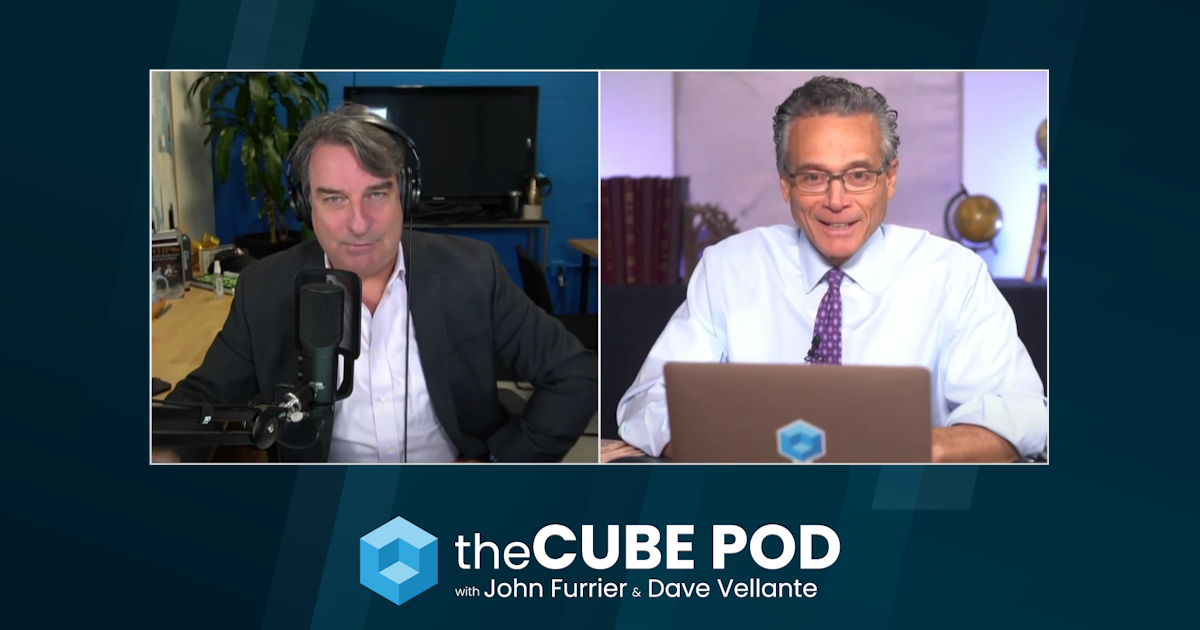It’s not just hype anymore — artificial intelligence is officially rewriting the rules of the tech economy. From regulatory battles rocking Big Tech to the explosive rise of AI-native challengers, AI disruption is forcing a high-stakes reset across infrastructure, innovation and influence.
The traditional playbook is breaking down as agentic AI, shifting data strategies and geopolitical pressures collide, creating a rare moment of both instability and opportunity. The pace of transformation is only accelerating. Giants such as Google LLC and Meta Platforms Inc. are under legal fire while startups such as OpenAI Inc., Perplexity AI Inc. and Anthropic PBC are racing ahead.
In this landscape, success won’t hinge on legacy dominance — it will come down to who owns the data, who scales infrastructure fastest and who can deliver AI that earns real-world trust, according to industry analysts John Furrier (pictured, left) and Dave Vellante (right) during the latest theCUBE Podcast episode.
“It’s as if there’s an earthquake; it’s a supermoon cycle going on,” Furrier said. “A supermoon, super cloud, super chips, but there’s going to be like there’s an earthquake happening. The tectonic plates and tech are shifting because the signaling of going after Meta — they’ve just got to defend against that.”
AI disruption and the next wave of enterprise transformation
The AI disruption in enterprise tech is already in motion — and it’s not just about flashy tools or demos. It’s about who controls the data, who adapts fastest and who can turn agentic AI into a real strategic edge. Companies such as Salesforce Inc. are showing that legacy doesn’t have to mean slow, leveraging their deep workflows and data to stay competitive, while fast-moving upstarts — such as Perplexity and Anthropic — are gaining ground with bold products and smart partnerships, according to Furrier.
“You’ve got FTC going after Google. These are the incumbent leaders, the big tech,” he said. “Nvidia’s stock got hammered. They’re in China trying to save their quarter. It’s just [a] pretty disruptive time in transitions and disruption; enablement is here. We’re seeing it and covering it … all the signals are coming in.”
The contrast between AI disruption and enablement is central to understanding this phase of change. While regulatory and economic forces batter the biggest names in tech, the emergence of agentic systems — AI that acts autonomously within workflows — could unlock productivity and new business models. This evolution builds on cloud-native foundations but pushes further into dynamic, intelligent orchestration.
“The new guard is emerging fast, and the old guard is nimble like Salesforce. Marc Benioff’s going to come on and talk about that,” Furrier added. “He had him and Satya Nadella at Microsoft going head-to-head. This is an interesting time of change. It’s not like it’s a slowdown; it’s a ramp up, and it’s just a whole other game in the arena, on the field.”
TheCUBE set to talk with Marc Benioff as Salesforce doubles down on agentic AI
Salesforce founder Marc Benioff is stepping back into the spotlight in an upcoming interview with theCUBE’s George Gilbert and Dave Vellante — an appearance that couldn’t be timelier. As enterprises grapple with how to operationalize agentic AI, Benioff’s track record as a trendspotter and cloud pioneer makes his perspective especially valuable. Salesforce isn’t just reacting to change — it’s engineering it, with a focus on harmonized data and AI agent orchestration, according to Vellante.
“Salesforce is one of the early leaders in agentic, and what they’ve done is they’ve done a lot of the hard engineering work to bring together their data cloud,” he said. “They are deploying agents; they’re orchestrating and governing those agents. They’ve got the advantage in that they’ve got a dataset and they’ve got all these assets and they have a lot of data about the customer.”
Despite often being viewed as a target for AI disruption, Salesforce may be better positioned than most to thrive in this next wave of AI. The company’s rich datasets and legacy of agility give it an edge — even against the most ambitious startups, Furrier pointed out.
“I think we’re in a very interesting time where Salesforce would look like a target, if I was a startup, to take down Salesforce,” he said. “And VCs are like, ‘Yeah, go take down Salesforce.’ I don’t think they could be taken down. I think from now with AI, they can make their products better faster.”
Regulatory pressure exposes fragility of legacy tech empires
Regulators are back in the spotlight, and their renewed aggression is shaking up Big Tech. The FTC’s high-profile cases against Meta and Google echo the Microsoft Corp. antitrust battles of the early 2000s, and they’re already having an impact. Meta reportedly offered a billion-dollar settlement to dodge further litigation, signaling just how seriously it views the threat. Even if these trials drag on, the distraction alone could slow these giants down and create space for faster, hungrier challengers to move in, according to Vellante.
“The FTC wants to break up Google. They want $30 billion of rawhide from [Mark Zuckerberg]. You saw the report that … he offered $450 million to make it go away, and then he upped it to a billion. ‘I’ll give you a billion dollars if you don’t try to break me up,’” Vellante said. “I don’t think he’s going to lose, ultimately, the trial, but I think it’ll take years.”
That kind of regulatory heat inevitably shifts the market conversation. Whether the FTC succeeds or not, it’s already influencing strategy and investment. New voices are entering the conversation. Startups are building for gaps that the giants may now be too distracted — or too slow — to fill, according to Furrier.
“It’s definitely that Google has been monopolizing online advertising because they just cleared the field. They just won everything,” he explained. “At some point, you’re big, and the government’s actions are a little bit too late and a dollar short, in my opinion. I think it’s just a distraction. But it does open the door, just that hiccup, gives people like Perplexity and OpenAI a chance to compete.”
Watch the full podcast below to find out why these industry pros were mentioned:
Brian J. Baumann, founder of NYSE Wired and director of capital markets, technology at NYSE
Scott Hebner, principal analyst for AI at theCUBE Research
Marc Benioff, chair and CEO of Salesforce
George Gilbert, principal analyst at theCUBE Research
Mark Zuckerberg, CEO of Meta Platforms
Rob Hof, editor-in-chief at News Media
Satya Nadella, chairman and CEO of Microsoft
Andrew N. Ferguson, chairman of the FTC
Lina Khan, former chair of the Federal Trade Commission
Jensen Huang, founder and CEO of Nvidia
Warren Buffet, chairman and CEO of Berkshire Hathaway
Gary Gensler, chairperson, U.S. Securities and Exchange Commission
Vitalik Buterin, founder of Ethereum
Donald Trump, 45th and 47th president of the United States of America
Howard Lutnick, US Secretary of Commerce
Kara Swisher, journalist
Matt Garman, CEO of AWS
Michael Dell, chairman and CEO of Dell Technologies
Here’s the full episode of this week’s theCUBE Pod:
Don’t miss out on the latest episodes of “theCUBE Pod.” Join us by subscribing to our RSS feed. You can also listen to us on Apple Podcasts or on Spotify. And for those who prefer to watch, check out our YouTube playlist. Tune in now, and be part of the ongoing conversation.
Photo: News
Your vote of support is important to us and it helps us keep the content FREE.
One click below supports our mission to provide free, deep, and relevant content.
Join our community on YouTube
Join the community that includes more than 15,000 #CubeAlumni experts, including Amazon.com CEO Andy Jassy, Dell Technologies founder and CEO Michael Dell, Intel CEO Pat Gelsinger, and many more luminaries and experts.
THANK YOU








